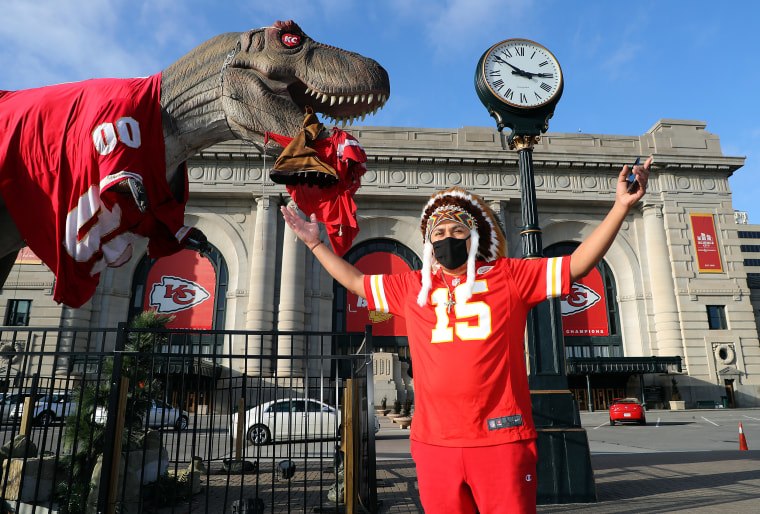The Kansas City Chiefs — who are playing the Tampa Bay Buccaneers during Super Bowl LV on Sunday — are just delaying the inevitable. They will eventually drop their name.
They will be forced to do away with the dehumanization and commodification of Native Americans that are their name and logo and beloved team traditions. It will happen.
They’re just being stubborn right now and refusing to simply ride the massive wave of change occurring at this moment in this country.
We’ve already seen this story play out; so have they. They’ve simply chosen the more difficult path.
There was, after all, once another professional football team with a racist, nasty name — this one, defined by the dictionary as a slur against Indigenous peoples. The team hails from Washington, D.C., and its fantastically obstinate owner once told USA Today Sports during an interview that he would “NEVER” change the name. He even instructed the reporter to use all caps.
It doesn’t take a long lens to see that the Chiefs — and the NFL — are not facing this issue head-on.
Well, that didn’t last. That same organization — currently temporarily calling itself the Washington Football Team — announced in July that it was, finally, changing the name. No apology was ever issued by that once immovable owner, but he changed the name all the same.
Five months after that announcement, the Cleveland Indians — who for years dug their cleats into the Kentucky bluegrass over both their name and their mascot — finally said they, too, are done with their team name and the associated racist caricature mascot, Chief Wahoo.
“We believe our organization is at its best when we can unify our community and bring people together — and we believe a new name will allow us to do this more fully,” the team said in a statement.
But it would appear the Kansas City Chiefs do not (yet) share that sentiment. They think simply banning headdresses and face paint “styled in a way that references or appropriates American Indian cultures and traditions” from their stadium is enough.
The Chiefs will be forced to do away with the dehumanization and commodification of Native Americans.
But while their fans are not allowed to appropriate our cultures and traditions (during home games), the team itself still can — with that stupid, massive drum that celebrities and VIPs (like actor Paul Rudd) bang before home games, its arrowhead logo and even the name of stadium, Arrowhead Stadium.
And what about other stadiums? As it currently stands, a fanatical Chiefs fan could travel to any other NFL stadium and don a headdress, wear faux war paint, wrap himself in a loincloth and tomahawk chop all the way to his seat if he wanted to.
It doesn’t take a long lens to see that the Chiefs — and the NFL — are not facing this issue head-on. They just want you to think they are. Their actions are little more than public relations stunts — a bandage on a gaping wound.
Indeed, the Chiefs are responding to social pressure, not social science in making their decision: It was more than 15 years ago that the American Psychological Association called for the immediate abolishment of all American Indian mascots everywhere because there is empirical evidence that proves these images and language harm the mental health and stability of kids, Native and non-Native alike.
Racism is always ugly, but it seems to get even uglier when it’s welcomed on a national stage like the Super Bowl.
No matter what Native American mascot and team name apologist may say on the matter, asking for their removal isn’t a political correctness issue. This has been and will continue to be an issue of protecting the well-being of our kids, yours and mine.
That’s why, all over the country, local schools, small cities and even big businesses are abandoning their Native American mascots. Land O’Lakes dropped its "Indian maiden" from its logo, the insurance company Mutual of Omaha ditched its bulbous “Indian head” bust and Leinenkugel's, the beer company, retired its image of a Native woman with a single feather in her hair late last July.
Still, the Chiefs are not alone in their dogged inflexibility: The NHL’s Chicago Blackhawks have thus far refused to change their name and logo.
Naturally, a protest against Native mascots is slated to be held outside the Super Bowl in Tampa, Florida — and there is no doubt that protesters will be met with war whoops and vitriol like, “Get a job,” and, “Go back to the reservation,” because that’s how it goes. Anti-Native sentiment remains one of the last holdouts of blatant American racism, excused and welcomed by wild sports heads of all colors and creeds.
Racism is always ugly, but it seems to get even uglier when it’s welcomed on a national stage like the Super Bowl. How much longer do we Natives have to be subjected to this shame? When we look back on this brutal epoch, both teams and their intransigence will stand as a monument to pigheadedness and denial during a time of growing racial justice in the U.S.
No one really knows how long it will take for the Kansas City Chiefs to get with the times and to see what they’re doing enables racist behavior against Natives — a demographic that already faces evil hatred as it is, and all too frequently. But it is inevitable that they will change their name. As the owner of the Washington Football Team already learned: Never say “NEVER.”





